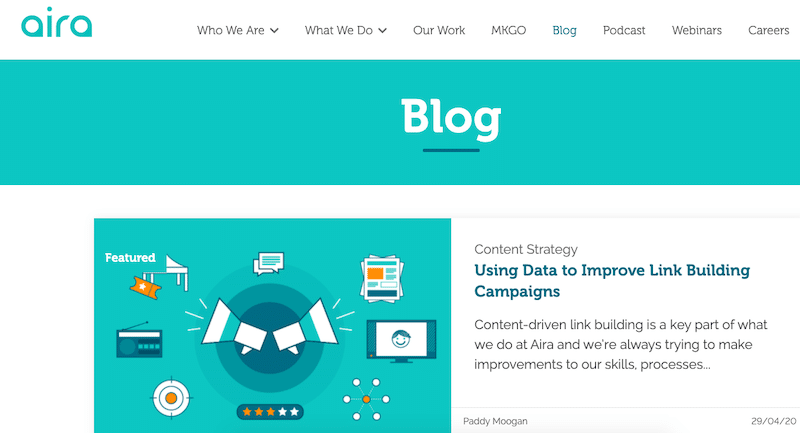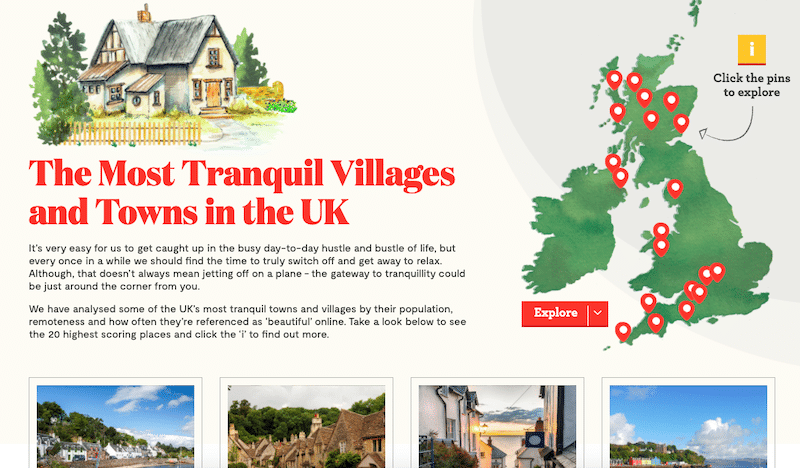How to Build Trust Online & Become an Authoritative Source (While Building Links)

I like to look at websites and online brands the same as I do humans…
You wouldn’t go out for dinner with a randomer you just met on the dodgy side of town (well you might do, but each to their own), so why would you commit to purchasing or trusting information from a website you’ve just heard of that popped up on a weird Instagram sponsored post?
Becoming a trustworthy person and website takes both time and effort, and I’m going to try and explain how to build trust online on your own website, or a client website, while building links!
Make sure your content and information is valuable
Making sure your website has valuable information and interesting content is key to success when building authority online. If it doesn’t cover the basics of what your company does and sells, then Google - and humans - won’t look at it as a legitimate site.
Take Aira’s website, for example - you land on the page and you know exactly what we do and who we are. When you move through to the blog you start to get an understanding of what we specialise in and why we do what we do - essentially, we’re selling ourselves and sharing information and content that is valuable to the user.
Once the basics are covered, such as a decent blog, you can start to get a little more creative - what about ideating and doing research, analysing data and then generating content to create a story that sparks conversation?
This can be anything from interactive in-depth research to a simple top 10 blog post or listicle (you can read more about ideation here). What matters at this point is that you’re generating content that is both interesting and valuable to your customer/audience.
Share with the right people to build authority
Once you’ve generated the content with a designer or developer, it’s important to do something with it. You wouldn’t make a meal and leave it sitting on the side and not eat it? So don’t spend all of your time and effort generating ideas, pulling together data and writing copy to just leave it sitting on the site.
You now need to get this story into a press release and send it to the right journalists to build some juicy links in order to gain authority online.
Easier said than done…
I’m going to take you through the steps us digital PRs follow at Aira in order to make sure we’re approaching the right journalists with our stories and therefore generating links.
1) Nail your stories and angles
Take some time to really analyse the content you’re generating to establish the interesting hooks and stories that are in it.
Take this content, for example. When analysing this we could see far more angles than we originally thought.
The obvious one: ‘The most tranquil villages and towns in the UK’, but there were also angles such as: ‘Top staycation destinations in the UK’ and ‘Best mini-moon destinations’, meaning that our story was relevant to various sectors of the press
2. Build more than just a media list
Media lists in PR are 101 - everyone builds them, they’re a pretty standard practice if you work in the industry. But, this is probably the most important part of building your authority online and generating links.
You have to make sure you’re going to the right people who, a) are going to want to cover your story, and b) are the best people to approach.
For example, a freelancer may write for a big top-tier publication, such as the Independent and they may look as if they’d be interested in featuring your story, but it doesn’t mean they are the best person to approach - a freelancer then has to pitch the story to the editor/PoC at the publication and it could be a long waiting game.
It’s better to approach the key contact at the news outlet - such as an editor or even the newsdesk (it does work!!)
Here are just a few simple steps to building a media list:
- Establish sectors of the press you want to approach: nationals, lifestyle, regionals, HR etc
- Then fill in the key publications within those sectors that would feature a similar topic to yours - tools such as Vuelio and Gorkana are great for this, but even just a manual Google search can find a new site you haven’t seen before
- Once you’ve done this, a manual search on said sites is key - go to the search bar of the publication and search for the topic of your story. For example, ‘holiday destinations in the UK’ or ‘top TikTok accounts’ and manually look through the types of journalists that are already talking about your topics, and add them to your list
- Now it’s time for the media databases to do their thing - head on over to the likes of Gorkana, Vuelio or Roxhill to find the journalist’s email address and details. If you’re struggling, do a quick search on Twitter or drop them a DM
- At this point, you should have the bulk of your media list, but you still need to do the most important bit (and actually it doesn’t matter if you do this at the start or end of building your list) - pop some of your competitors’ campaigns into the likes of Ahrefs, Buzzsumo and Majestic to see if they’ve gained any coverage from journalists that aren’t already on your list
3. Sell your story during outreach
Sometimes looked at as the easiest part - in outreach essentially you’re just sending an email. But it needs to be super succinct and clear. Here are a few tips to follow:
- Create a subject line that you can envisage as a headline
- Sell the story within the first few sentences of the pitch email
- Provide the key stats and angles that specific journalist needs - for example, if you’re pitching to a Scottish regional, make sure they have specific data for their readership
- Give them absolutely everything they need to feature the story - images, data, press release
- If you don’t hear back, give them a few days before you follow up with them - remember they’re just a human with busy inboxes and life pressures, too
Gaining results to build authority
After the above process has taken place, it should hopefully lead to some juicy coverage and links across a variety of the sites you’ve pitched into, meaning that they trust the research, knowledge and information from your content.
From generating links on other trusted top-tier sites, your website can gain traffic from people who trust them as a source. This, alongside a mixture of other digital marketing and SEO tactics, can boost domain authority and lead to an increase in rankings.








